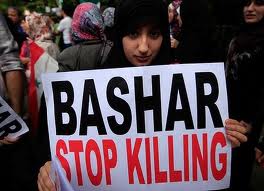 While his loyalists in Damascus call him “Lieutenant General Doctor,” his enemies in the West call him a “weak dictator.” That’s Bashar al-Assad, the President of the Arab Republic of Syria, the secretary general of the governing Ba’ath Party of Syria, and currently the world’s bloodiest despot.
While his loyalists in Damascus call him “Lieutenant General Doctor,” his enemies in the West call him a “weak dictator.” That’s Bashar al-Assad, the President of the Arab Republic of Syria, the secretary general of the governing Ba’ath Party of Syria, and currently the world’s bloodiest despot.
Bashar, who will be 46 years old on the tenth anniversary of the September 11 attacks, is a trained ophthalmologist and only accidentally a military officer. He joined the army to become the heir to his father, Hafez al-Assad, following the death of his brother, Basil.
When Bashar was barely four years old, his father, General Hafez, a trained fighter pilot, became the dictator of Syria in February 1970 until his death in June 2000. Hafez was famous for brutally cracking down on his dissidents against his regime.
In 1982 for instance, the Syrian army conducted a scorched earth strategic operation in response to a revolt by Sunni Muslims in the city of Hama, resulting in the deaths of thousands. Authors like Robin Wright have called it “the single deadliest act by any Arab government against its own people in the modern Middle East.”
Human rights activists estimate the death toll from that 1982 massacre at around 10,000, but the Syrian Human Rights Committee believes that as many as 40,000 people perished. A scorched earth military strategy involves destroying anything to defeat the enemy, from food and water sources to electrical power to hospitals — just everything.
When Hafez died, the Syrian parliament, Majlis al Sha’ab, amended the constitution to lower the age required for one to become president from 40 years down to 34 so as to accommodate Bashar. He then went on to win election with 97.2 percent of the vote. In 2007, Bashar again won with 97.6 per cent.
After four decades as the most privileged Syrian, Bashar cannot understand why people are against him. Worse even, behind him there are scores of generals and party cadres who want him to stay in power for their personal interests.
Thus, it is a typical third-world mentality that is holding sway in Syria. So far, the Syrian security and defence forces have killed at least 2,000 and counting, despite massive international condemnation. Bashar, once thought to be a weak dictator, is proving to be the opposite. The tyrant is faced with only two choices: kill to survive or get out.
Last weekend, heavy attacks were launched in the city of Latakia in the northwest. The Syrian armed forces used naval ships, tanks, artillery and heavy machine guns to wipe out what the Bashar government calls the “armed gangs,” although in reality some of them are children and their mothers.
Now anybody against the regime must die.
Among the victims were the Palestinian refugees in Latakia, as many as 10,000 of whom, according to the United Nations, fled, prompting Palestinian President Mahmoud Abbas to proclaim that Syria is now committing crimes against humanity, a serious accusation that could see President Assad facing a possible prosecution in the International Criminal Court
Syria’s neighbour, Turkey, through Foreign Minister Ahmet Davutoglu, said on Monday: “This is our final word to the Syrian authorities,” and insisted the regime’s crackdown must end immediately and unconditionally.
From London, the press on Tuesday quoted British Foreign Secretary William Hague saying that he was appalled by the ongoing repression of civilians and added that, “President Assad was losing his last shreds of legitimacy.”
In Washington, the United States Secretary of State Hillary Clinton, speaking at the national security forum at the National Defence University, rejected the suggestion that the administration was reacting too slowly to the slayings of protesters in Syria. Clinton argued that America’s demands for the removal of Assad would accomplish little without the support of Syria’s neighbours and other Arab nations.
“If Turkey says it, if [Saudi] King Abdullah says it, if other people say it, there is no way the Assad regime can ignore it,” observed Clinton, who noted that a “chorus of condemnation” is necessary.
On Clinton’s side was Leon Panetta, the newly appointed Secretary of Defence, who boasts the unique credentials of overseeing the killing of Osama bin Laden in May when he was the head of the Central Intelligence Agency. Make no mistake, though: after disappointment in Libya, the US has no appetite for another unpredictable militarily confrontation.
As the world turns against the Syrian regime, one friend from the east is still supporting Damascus: Tehran. Iran has so far succeeded in pressuring Iraq to urge for a dialogue between the government and the opposition rather than singing the chorus of condemnation. But how can the armed guys talk to the dying ones?
Fortunately for Bashar, and unfortunately for the people of Syria, their country has very little oil; otherwise, things would have been completely different today.
By: Mobhare Matinyi
A consultant based in Washington, DC

Leave a Reply
You must be logged in to post a comment.